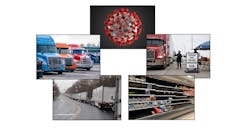OOIDA, ATRI examine COVID-19 impact on trucking industry
Long-haul trips are down and local trips are up according to the latest research by the American Transportation Research Institute (ATRI) and the Owner-Operator Independent Driver Association (OOIDA) Foundation.
The organizations came together for a joint examination of the impact of the novel coronavirus pandemic on all aspects of trucking operations, including deliveries, travel times, detention and truck parking. They also provided recommendations and guidance on strategies for any future national disasters.“The trucking industry has weathered national disasters in the past, and is doing so again through the current COVID crisis,” said Rebecca Brewster, ATRI president and chief operating officer. “However, this latest data quantifies the challenges motor carriers and drivers are facing during this pandemic to keep essential goods moving.”
Key findings include:
- Long-haul trips are down considerably as container imports at ports dried up. At the same time, local trips of less than 100 miles increased by more than 100%.
- While certain segments of the industry, such as medical devices, perishable foods and paper products, saw solid COVID-related increases in truck traffic, nearly 50% of respondents described freight levels as “somewhat to much” lower due to COVID.
- Nearly 70% of specialized and tank truck operations were negatively impacted. In nearly every instance, smaller fleets reported greater negative impacts than larger fleets.
- More than 40% of respondents said that truck parking was not any worse due to the COVID pandemic, but by fleet size, the larger fleets did describe truck parking as more difficult to find during the pandemic.
- The research confirmed that driver detention generally did not change due to COVID. However, owner-operators and small fleets experienced much worse detention delays relative to larger fleets.
- In terms of disaster planning, almost 80% of owner-operators and small fleets do not have any plan in place for managing operations during natural disasters.
- The trucking industry generally has a favorable attitude towards state and federal responses, policies and programs set up to address the pandemic, with the federal response viewed as more favorable than the state responses.
- The trucking industry’s perceptions about the country’s economic situation over the next several months leans slightly pessimistic—both in terms of freight movement and consumer spending.
“This research puts solid numbers to what we otherwise only suspected,” said Andrew King, research analyst for the OOIDA Foundation. “While we may be turning the corner on the COVID pandemic, we’re not out of the economic woods yet.”
Download the full report here.
